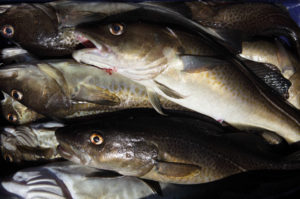
Agencja Fotograficzna Caro / Alamy Stock Photo
30 August 2019: Environmental NGOs Seas At Risk, Our Fish and Oceana are deeply disappointed that today’s Commission proposal for fishing limits in the Baltic allows for the continuation of overfishing in 2020, even though there is a legal deadline to end overfishing by 2020 under the EU Common Fisheries Policy. The Commission’s proposal includes fishing limits that exceed scientific advice for the iconic western Baltic herring and main basin Baltic salmon. It also leaves a gaping loophole for over-exploitation of the threatened eastern Baltic cod.
Overfishing is a serious problem in the Baltic, the European Union and worldwide. It not only depletes fish stocks, disrupts marine food webs, and massively increases pressure on the fragile balance of marine ecosystems, but also affects the food and employment security of millions of Europeans. Currently 69% of the fish stocks are overfished in EU waters, and 50% in the Baltic. Despite the clear fail for certain stocks, the Commission has followed scientific advice for the majority of cases (6 out of 10), which NGOs welcome.
“In light of the collapse of eastern Baltic cod, and the 2020 deadline, it is incredible that the Commission still allows for overfishing in 2020, disregarding the scientific advice for Western Baltic Herring. With accumulating scientific evidence of a climate and biodiversity crisis in our seas, this is not the time for the Commission, the guardian of the EU Treaty, to delay urgently needed and EU-wide agreed action. We recognize the efforts made following scientific advice for a majority of fish stocks, however this year the legislation is clear: all harvested stocks must be fished at sustainable levels, there is no room for loose ends.” Rebecca Hubbard, Our Fish Program Director, said.
“The Commission’s proposal should not only mandate sustainable fishing limits, but aim to deliver healthy fish populations by 2020, as demanded by EU regulations. Instead they have failed to propose the rapid action that is needed to lift the Baltic Sea out of the full scale ecological crisis it is experiencing. While the Commission has proposed zero targeted fishing on eastern Baltic cod, known loopholes related to trawl fishing mean that this is not enough. EU Member States, will need to build on this proposal and take a range of other measures urgently in order to save the cod.” Andrzej Białaś, Policy Advisor, Oceana Europe said.
“Fisheries Ministers will have the last word to uphold the good ambition shown by the Commission for some stocks, or show responsibility by following scientific advice for others like the western Baltic herring and the Main Basin Salmon. From 1 January, overfishing will be illegal in the EU waters, and Ministers need to act accordingly.” said Andrea Ripol, Fisheries Policy Officer of Seas At Risk.
The 2020 fishing quotas for the Baltic proposed by the European Commission today, will be decided at the AGRIFISH Council of Fisheries Ministers on 14 and 15 October in Luxembourg. This will be the last chance for the EU to end overfishing in the region by 2020.
For more information:
Dave Walsh, Communications Advisor, Our Fish, dave@our.fish, +34 691 82 67 64
Andrea Ripol, Fisheries Policy Officer, Seas At Risk, aripol@seas-at-risk.org +32 486 16 83 96
Andrzej Białaś, Policy Advisor, Oceana Europe
abialas@oceana.org, +48 501 58 88 33
NOTES TO THE EDITORS
Common Fisheries Policy:
The reformed Common Fisheries Policy includes the fundamental objective to progressively restore and maintain fish stocks above sustainable levels, specifically above levels capable of producing the maximum sustainable yield. The legislation also states that this objective shall be achieved by 2015 or progressively by 2020 at the latest for all stocks. Moreover, the Common Fisheries Policy mentions that measures should be taken in accordance with the best available scientific advice. (Article 3(c) of the CFP Basic Regulation).
Eastern Baltic cod:
ICES has advised zero catch and the Commission had to put in place emergency measures in an attempt to stop the stock from an unrecoverable crash. We welcome the Commission proposal to continue the closure of all directed cod fishing and the proposed continuation of a spawning closure. However, Ministers need to ensure that demersal trawlers do not endanger any prospect of a recovery by a massive bycatch of eastern Baltic cod when trawling for flatfish such as flounder and plaice.
Western Baltic herring:
For the second year in a row the ICES advice is a zero catch. Last year the Commission and Council ignored that advice. The Commission has ignored that scientific advice again, instead supporting a political short-sighted argument that immediate social-economic issues should take precedence over the recovery of the fishery. Studies have shown that if EU fisheries were sustainably managed, we would see significant socio-economic benefits in the form of increased revenues, GDP growth and added jobs in both fisheries and connected sectors, so there is no reason for the Commission and Council to ignore the scientific advice for sustainable limits.
The warning signals from ICES are clear e.g. “Recruitment has been low since the mid-2000s and at a historic low for the last four years.” We cannot negotiate nature’s limits.
Baltic salmon (Main Basin): The scientific advice for the salmon is very clear stating a commercial wanted catch of a total of 58 900 salmon. The Commission has proposed 86,575 salmons and we do not accept this proposal since it is not in line with EU regulations and scientific advice.
Weblinks:
Commission Proposal for Baltic Sea fishing Total Allowable Catches
NGOs recommendations on Baltic fishing opportunities for 2020 are available at: https://www.fishsec.org/2019/06/10/joint-ngo-recommendations-on-baltic-sea-fishing-opportunities-for-2020/
COMMISSION IMPLEMENTING REGULATION (EU) 2019/1248 of 22 July 2019 establishing measures to alleviate a serious threat to the conservation of the eastern Baltic cod (Gadus morhua) stock
https://eur-lex.europa.eu/legal-content/EN/TXT/PDF/?uri=CELEX:32019R1248&from=DE
Web link to EU press release re eastern Baltic cod emergency measures
http://europa.eu/rapid/press-release_IP-19-4149_en.htm
ICES advice on western Baltic Herring Published 29 May 2019 http://ices.dk/sites/pub/Publication%20Reports/Advice/2019/2019/her.27.20-24.pdf
ICES advice on Atlantic salmon in the Baltic Sea, excluding the Gulf of Finland http://ices.dk/sites/pub/Publication%20Reports/Advice/2019/2019/sal.27.22-31.pdf
